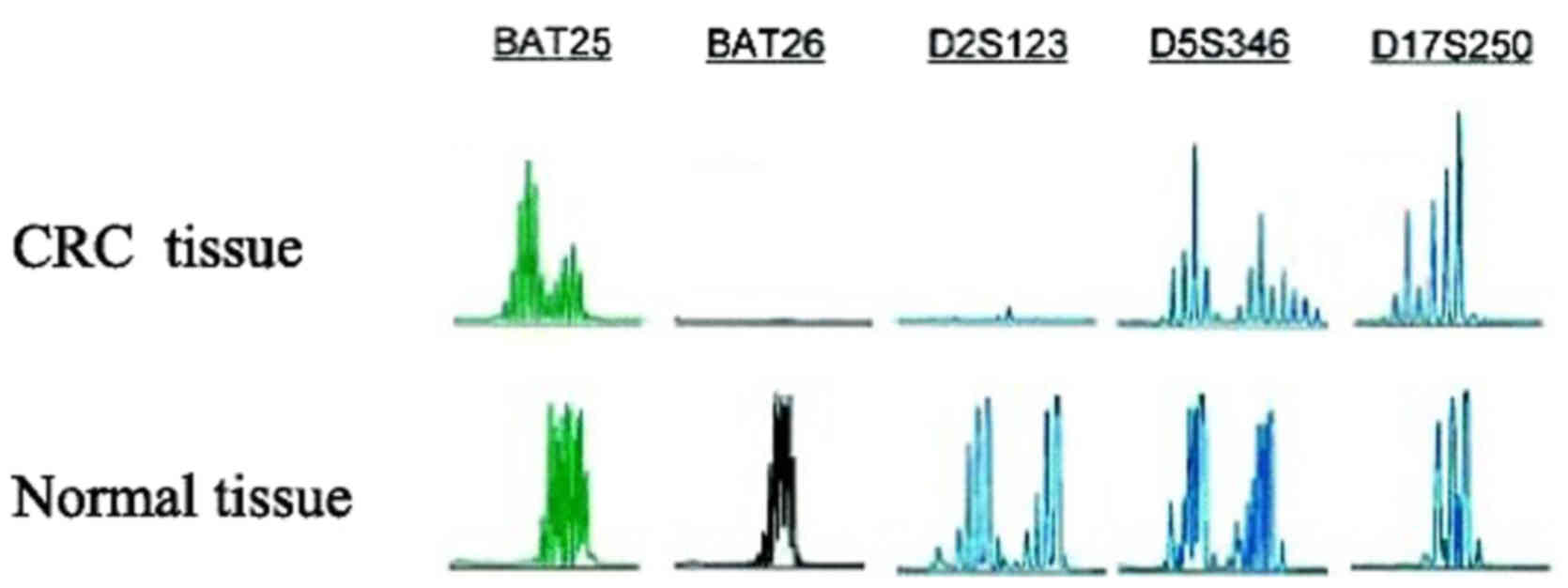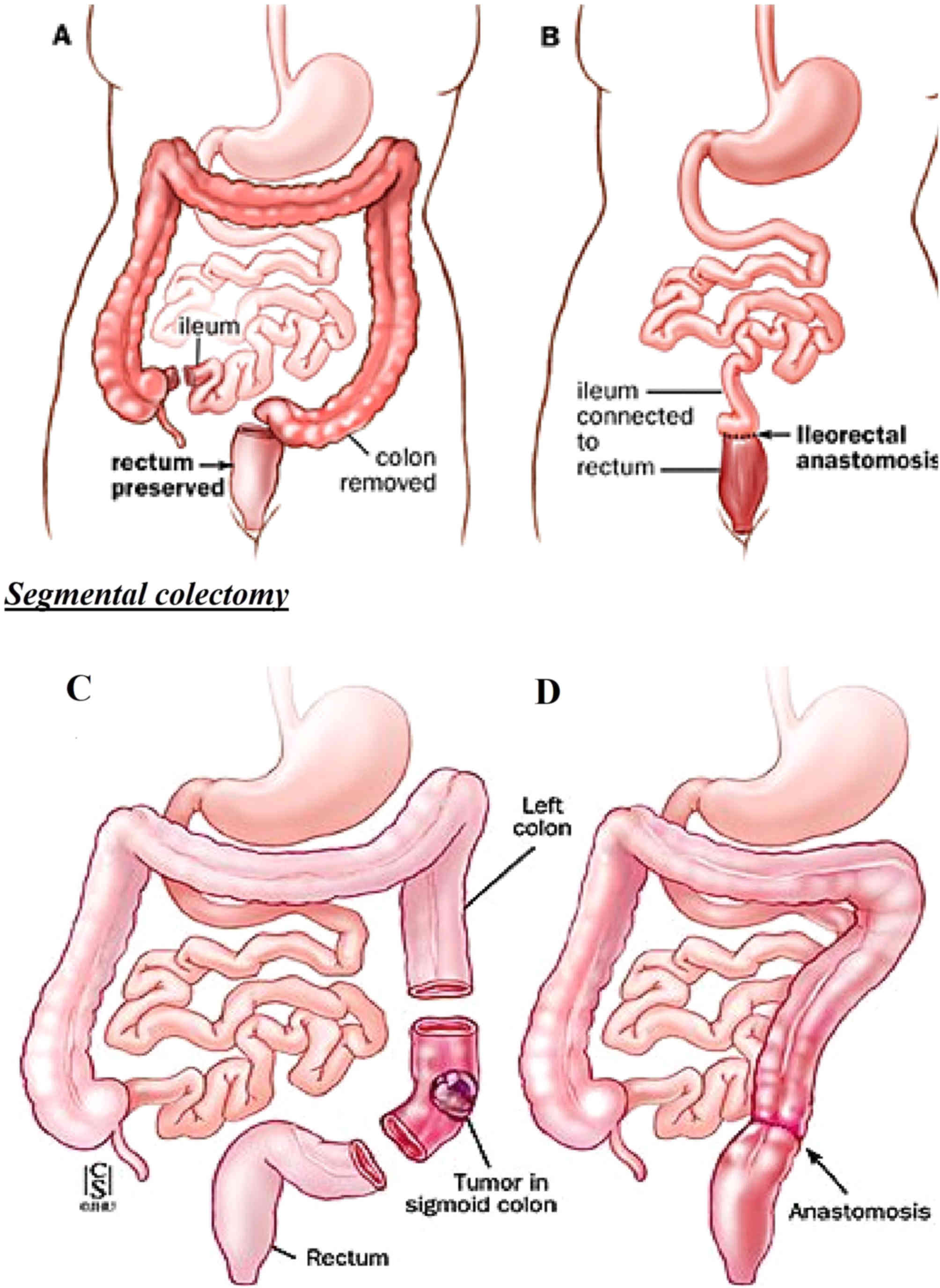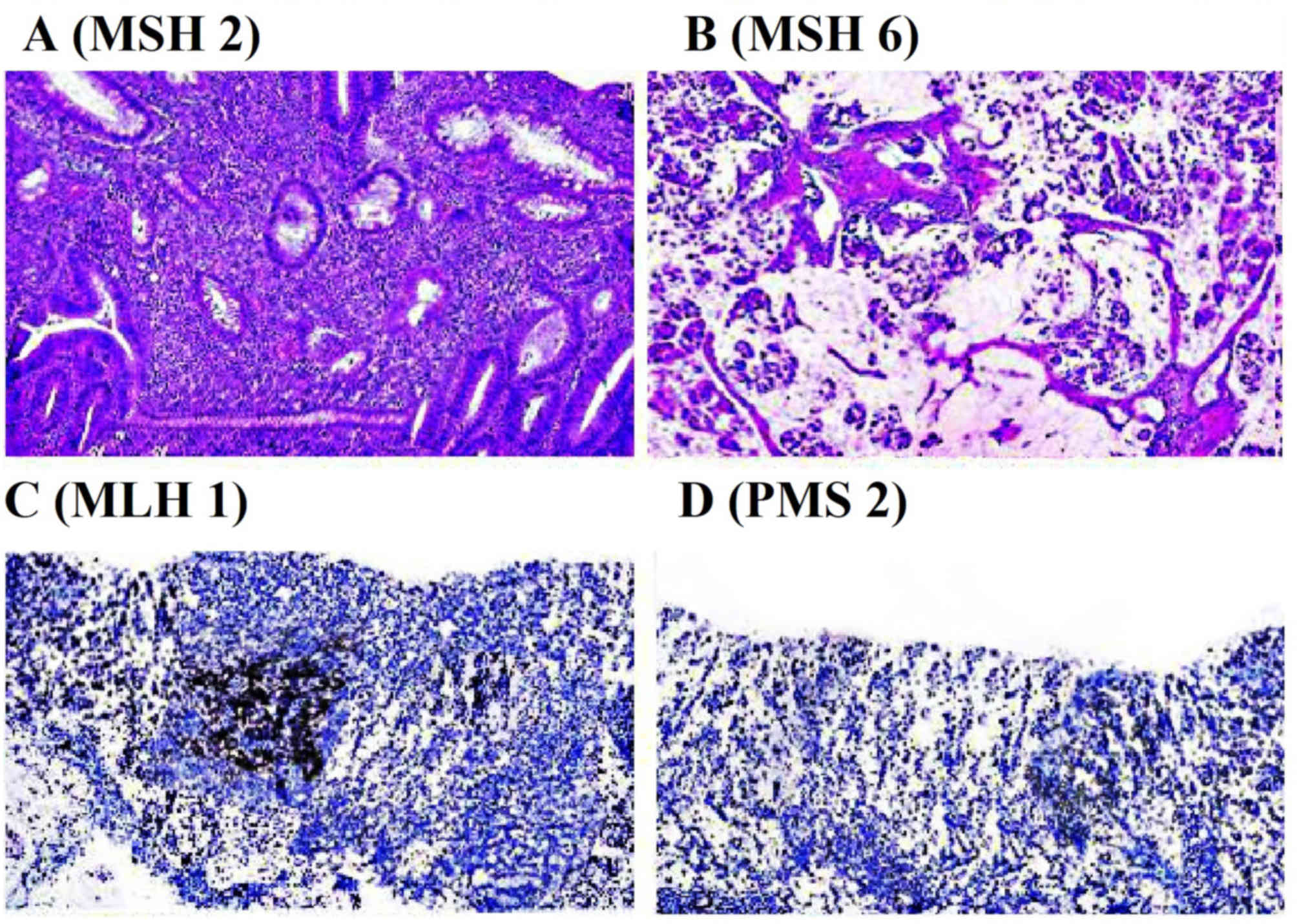|
1
|
Steinke V, Engel C, Büttner R, Schackert
HK, Schmiegel WH and Propping P: Hereditary nonpolyposis colorectal
cancer (HNPCC)/Lynch syndrome. Dtsch Arztebl Int. 110:32–38.
2013.PubMed/NCBI
|
|
2
|
Kalady MF: Surgical management of
hereditary nonpolyposis colorectal cancer. Adv Surg. 45:265–274.
2011. View Article : Google Scholar : PubMed/NCBI
|
|
3
|
Rebeccah B and Wise PE: Endoscopic and
surgical management of hereditary nonpolyposis colorectal cancer.
Clin Colon Rectal Surg. 25:90–96. 2012. View Article : Google Scholar : PubMed/NCBI
|
|
4
|
Lynch HT and de la Chapelle A: Hereditary
colorectal cancer. N Engl J Med. 348:919–932. 2003. View Article : Google Scholar : PubMed/NCBI
|
|
5
|
Rodriguez-Bigas MA, Chang GJ and Skibber
JM: Surgical implications of colorectal cancer genetics. Surg Oncol
Clin N Am. 15(51–66): vi2006.
|
|
6
|
Brandão C and Lage J: Management of
patients with hereditary colorectal cancer syndromes. GE Port J
Gastroenterol. 22:204–212. 2015. View Article : Google Scholar : PubMed/NCBI
|
|
7
|
Vasen HF, Möslein G, Alonso A, Bernstein
I, Bertario L, Blanco I, Burn J, Capella G, Engel C, Frayling I, et
al: Guidelines for the clinical management of Lynch syndrome
(hereditary non-polyposis cancer). J Med Genet. 44:353–362. 2007.
View Article : Google Scholar : PubMed/NCBI
|
|
8
|
Son IT, Kim DW, Jeong SY, Shin YK, Ihn MH,
Oh HK, Kang SB, Park KJ, Oh JH, Ku JL and Park JG:
Clinicopathological features and type of surgery for lynch
syndrome: Changes during the past two decades. Cancer Res Treat.
48:605–611. 2016. View Article : Google Scholar : PubMed/NCBI
|
|
9
|
Vasen HF, Watson P, Mecklin JP and Lynch
HT: New clinical criteria for hereditary nonpolyposis colorectal
cancer (HNPCC, Lynch syndrome) proposed by the International
Collaborative group on HNPCC. Gastroenterology. 116:1453–1456.
1999. View Article : Google Scholar : PubMed/NCBI
|
|
10
|
Umar A, Boland CR, Terdiman JP, Syngal S,
de la Chapelle A, Rüschoff J, Fishel R, Lindor NM, Burgart LJ,
Hamelin R, et al: Revised Bethesda Guidelines for hereditary
nonpolyposis colorectal cancer (Lynch syndrome) and microsatellite
instability. J Natl Cancer Inst. 96:261–268. 2004. View Article : Google Scholar : PubMed/NCBI
|
|
11
|
Schneider R, Schneider C, Jakobeit C,
Fürst A and Möslein G: Gender-specific aspects of lynch syndrome
and familial adenomatous polyposis. Viszeralmedizin. 30:82–88.
2014. View Article : Google Scholar : PubMed/NCBI
|
|
12
|
Dunlop MG, Farrington SM, Carothers AD,
Wyllie AH, Sharp L, Burn J, Liu B, Kinzler KW and Vogelstein B:
Cancer risk associated with germline DNA mismatch repair gene
mutations. Hum Mol Genet. 6:105–110. 1997. View Article : Google Scholar : PubMed/NCBI
|
|
13
|
Lindor NM, Petersen GM, Hadley DW, Kinney
AY, Miesfeldt S, Lu KH, Lynch P, Burke W and Press N:
Recommendations for the care of individuals with an inherited
predisposition to Lynch syndrome: A systematic review. JAMA.
296:1507–1517. 2006. View Article : Google Scholar : PubMed/NCBI
|
|
14
|
Järvinen HJ, Mecklin JP and Sistonen P:
Screening reduces colorectal cancer rate in families with
hereditary nonpolyposis colorectal cancer. Gastroenterology.
108:1405–1411. 1995. View Article : Google Scholar : PubMed/NCBI
|
|
15
|
Syngal S, Brand RE, Church JM, Giardiello
FM, Hampel HL and Burt RW: American College of Gastroenterology:
ACG clinical guideline: Genetic testing and management of
hereditary gastrointestinal cancer syndromes. Am J Gastroenterol.
110:223–263. 2015. View Article : Google Scholar : PubMed/NCBI
|
|
16
|
Samadder NJ, Smith KR, Wong J, Thomas A,
Hanson H, Boucher K, Kopituch C, Cannon-Albright LA, Burt RW and
Curtin K: Cancer risk in families fulfilling the Amsterdam criteria
for lynch syndrome. JAMA Oncol. 3:1697–1701. 2017. View Article : Google Scholar : PubMed/NCBI
|
|
17
|
van Duijvendijk P, Slors JF, Taat CW,
Oosterveld P and Vasen HF: Functional outcome after colectomy and
ileorectal anastomosis compared with proctocolectomy and ileal
pouch-anal anastomosis in familial adenomatous polyposis. Ann Surg.
230:648–654. 1999. View Article : Google Scholar : PubMed/NCBI
|
|
18
|
Karahan B, Argon A, Yıldırım M and Vardar
E: Relationship between MLH-1, MSH-2, PMS-2, MSH-6 expression and
clinicopathological features in colorectal cancer. Int J Clin Exp
Pathol. 8:4044–4053. 2015.PubMed/NCBI
|
|
19
|
Barrison AF, Smith C, Oviedo J, Heeren T
and Schroy PC III: Colorectal cancer screening and familial risk: A
survey of internal medicine residents' knowledge and practice
patterns. Am J Gastroenterol. 98:1410–1416. 2003. View Article : Google Scholar : PubMed/NCBI
|
|
20
|
Park J, Lee SY, Kim DW, Kang SB, Jeong SY
and Park KJ: Knowledge of and practice patterns for hereditary
colorectal cancer syndromes in korean surgical residents. Ann
Coloproctol. 29:186–191. 2013. View Article : Google Scholar : PubMed/NCBI
|
|
21
|
Win AK, Parry S, Parry B, Kalady MF,
Macrae FA, Ahnen DJ, Young GP, Lipton L, Winship I, Boussioutas A,
et al: Risk of metachronous colon cancer following surgery for
rectal cancer in mismatch repair gene mutation carriers. Ann Surg
Oncol. 20:1829–1836. 2013. View Article : Google Scholar : PubMed/NCBI
|
|
22
|
Rodriguez-Bigas MA and Möeslein G:
Surgical treatment of hereditary nonpolyposis colorectal cancer
(HNPCC, Lynch syndrome). Fam Cancer. 12:295–300. 2013. View Article : Google Scholar : PubMed/NCBI
|
|
23
|
Haanstra JF, de Vos Tot Nederveen Cappel
WH, Gopie JP, Vecht J, Vanhoutvin SA, Cats A, van der Zaag-Loonen
HJ, Langers AM, Bergmann JH, van de Meeberg PC, et al: Quality of
life after surgery for colon cancer in patients with Lynch
syndrome: Partial versus subtotal colectomy. Dis Colon Rectum.
55:653–659. 2012. View Article : Google Scholar : PubMed/NCBI
|
|
24
|
de Vos tot Nederveen Cappel WH, Buskens E,
van Duijvendijk P, Cats A, Menko FH, Griffioen G, Slors JF,
Nagengast FM, Kleibeuker JH and Vasen HF: Decision analysis in the
surgical treatment of colorectal cancer due to a mismatch repair
gene defect. Gut. 52:1752–1755. 2003. View Article : Google Scholar : PubMed/NCBI
|
|
25
|
You YN, Chua HK, Nelson H, Hassan I,
Barnes SA and Harrington J: Segmental vs. extended colectomy:
Measurable differences in morbidity, function, and quality of life.
Dis Colon Rectum. 51:1036–1043. 2008. View Article : Google Scholar : PubMed/NCBI
|
|
26
|
Natarajan N, Watson P, Silva-Lopez E and
Lynch HT: Comparison of extended colectomy and limited resection in
patients with Lynch syndrome. Dis Colon Rectum. 53:77–78. 2010.
View Article : Google Scholar : PubMed/NCBI
|


















